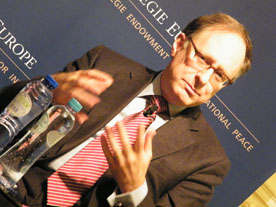NATO 3.0 – A 21st Century Alliance
NATO Deputy Secretary General Ambassador Alexander Vershbow gave a personal address about the fundamental challenges NATO is facing and his role in the organisation to a room packed full of young professionals on Wednesday 31 October.

“This is an opportunity to highlight NATO’s extraordinary capacity for reinvention since the end of the Cold War,” says Ambassador Vershbow talking to 60 members of Young Professionals in Foreign Policy (YPFP), Brussels, who organised the evening event that was held at at Carnegie Europe.
“Following the Lisbon and Chicago Summits, we are embarking on NATO 3.0 – an Alliance with stronger capabilities and stronger partnerships across the globe to meet the range of the 21st century challenges,” he adds.
Engaging young leaders

Focusing on his long career as a United States diplomat and his role at NATO, the Deputy Secretary General’s address was the October edition of YPFP’s monthly Ambassador Series. The address follows a number of evening discussions and workshops led by a high-profile Alliance figures, aimed at building the skills and knowledge of the next generation of leaders.
"YPFP's Ambassador Series offers our members the opportunity to engage with the most distinguished diplomatic representatives in Europe, in order to gain from their knowledge and experience,” says David Henry Doyle, Executive Director of YPFP Brussels.
"NATO's engagement with the next generation is remarkable – there is an understanding on the institution's part that our greatest tool in overcoming evolving threats is our human capital,” he says.
A different NATO
Following the Chicago Summit agenda set by Heads of State and Government in May, the Alliance is working to meet a number of challenges. In particular, NATO is transitioning security in Afghanistan to the Afghan National Security Forces and planning a post-2014 training mission. At home, every country in the Alliance is facing up to the global financial crisis, which is putting greater emphasis on multinational cooperation.
“NATO doesn’t and can’t operate in a vacuum, and so we’re working hard to build new and strengthen old partnerships around the globe. All of this is part of NATO 3.0,” explains Ambassador Vershbow.
"The security threats facing the globalised world today are very different from when NATO was created. Cyber security, international terrorism, environmental challenges and even financial instability are all aspects of a new security environment that requires young leaders and institutions to work together,” Doyle adds.
Sharing experience
To meet these challenges efficiently, we need to remember the lessons of the past and learn from those who have already experienced so much, explains Doyle, adding that the post-Cold War generation came of age under very different circumstances to previous generations, giving it a new kind of dynamism.
“As someone who until recently considered himself a ‘young’ professional, I have always enjoyed the opportunity to share some of the experience and insights I have gained during more than 35 years working as a practitioner in international security affairs,” says Ambassador Vershbow.
“I hope the discussion encouraged the participants to appreciate NATO’s continued importance to transatlantic security and the continuing need for an active, outward-looking Europe despite the current focus on the financial crisis,” he says. He adds that it is important that young professionals are given the confidence to present ideas that address the challenges of the 21st century.
